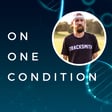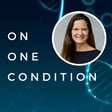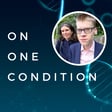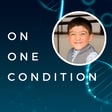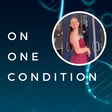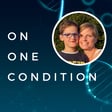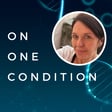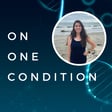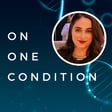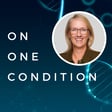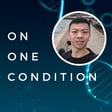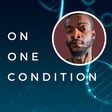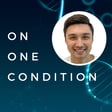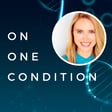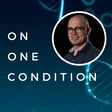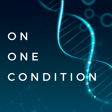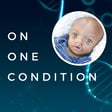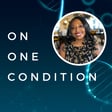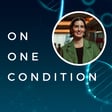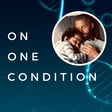Become a Creator today!Start creating today - Share your story with the world!
Start for free
00:00:00
00:00:01

Episode 59: Dwayne Wilson - Pompe Disease
Dwayne shares his journey of living with Pompe disease, a rare genetic condition also known as acid-maltase disease or glycogen storage disease type II. He opens up about how the condition changed his mindset, and his new mantra: enjoy life to the fullest. It drives his story, as he recounts navigating his diagnosis, participating in a clinical trial, and advocating for awareness. He emphasizes how finding a supportive community and maintaining positivity shaped his relationship with Pompe. This discussion is filled with resilience, humour, and an unwavering commitment to life despite challenges.
The song that Dwayne chose is Live It Well by Switchfoot.
Transcript
Introduction to 'On One Condition' and Dwayne Wilson
00:00:00
Speaker
Hi, I'm Sylvain Bertelot, and you're listening to On One Condition, a podcast to raise awareness about health conditions by listening to people who live them every day. My guest today is Dwayne Wilson, and we're going to talk about Pompe disease.
00:00:17
Speaker
Hi, Dwayne. Thank you for joining me very early for you. Thanks a lot for that. How are you doing? ah Good morning and well, ah good afternoon to you. I'm doing great. Thanks for having me.
Dwayne's Life Mantra and Song Choice
00:00:29
Speaker
Well, it's a pleasure. and we're going to talk about Pompeii. But before that, as you know, I love starting with a song. So which song did you choose and why?
00:00:41
Speaker
I chose Live It Well by Switchfoot, one of my favorite bands. I also like the song because once i you know I got my diagnosis, I had a change in my mindset about living life.
00:00:58
Speaker
And I and came up with this mantra where, you know, I i say I enjoy life to the fullest. Life is about having
Diagnosis at 50: A New Beginning?
00:01:10
Speaker
adventures and experiences, making memories with friends and family, living your best life. And the song just really touches me about, you know, cherish today because tomorrow's not promised and just to live your life well.
00:01:28
Speaker
and Okay, well, that's very nice. And straight away, I really want to ask you about this change of mindset, if you don't mind. Sure. What do you mean by that?
00:01:39
Speaker
Well, you know, i I was not diagnosed until I was 50 years old. So i live I've lived you know quite a many years and got my diagnosis in And bless that it is a one 5% of rare diseases that have treatment. But I was like, I could just, okay, I have this diagnosis and I could just sit on the couch and, you know, don't want to say, know, do nothing.
00:02:09
Speaker
But it was just a change in mindset that that's like, I still need to live life. You know, ah something else I also say is like getting the diagnosis was not an end for me.
00:02:20
Speaker
It was a new beginning, just ah thinking outside of the box and doing things differently. Wow. Okay. It's interesting because a lot of people who get a diagnosis describe it as something very hard that...
00:02:37
Speaker
really sets them back. ah Some people talk about depression after a diagnosis and so on. For you, this change of mindset, was it instant?
00:02:50
Speaker
You know, it wasn't instant. ah Once I got my diagnosis, I, of course, I'd never heard of Pompe disease. So, of course, I start Googling it. And when you Google things, everything comes up.
00:03:04
Speaker
Horrible. ah You know, life expectancy, you shouldn't live past 50. And I'm like, wait, I was just diagnosed at 50. That can't be right. You know, and once you start treatment, you've got 15 years to live and everything you read about it is all outdated.
00:03:23
Speaker
And i started to find Pompeii support groups on social media, on Facebook, and connected with other people that were diagnosed. And then I realized I wasn't alone.
00:03:38
Speaker
You know, a lot of other people had it that have already been on treatment for 10, 15 years. And,
Journey to Diagnosis and Support Groups
00:03:45
Speaker
I think at that point was when I found my community. I found my Pompeii community that I found. That's where I started to have that mind shift.
00:03:54
Speaker
um you know Whether it was six months or a year, you know not not certain. But when you start to realize that there were other people out there that had the same diagnosis as you, even though it is a rare disease, then you know other people are going through the same thing that you're going through.
00:04:13
Speaker
ah Because Pompe disease, unless you have it, you you don't know you know how it feels. Yeah, yeah. It's great. And I love social media for that because it's become so much easier to connect with people who have similar experiences as you do.
00:04:34
Speaker
Could you tell us more about how you got the diagnosis and and the symptoms of Pompeii for you as well, please? Well, you know, my my life kind of like went full circle where I was born in Southern California.
00:04:52
Speaker
I moved up to Spokane, Washington and like 1996. I lived there for like 12 years. Then I moved to Billings, Montana for four years, then back to Spokane.
00:05:06
Speaker
And then in 2017, I moved back to Southern California to be close to my family here, my mom and my sister. My dad had passed away in 2006 from prostate cancer.
00:05:20
Speaker
So I'd done some preliminary testing on myself for getting tested for prostate cancer in 2006. And, you know, I've always had high liver enzymes. My AST and my ALT have always been high.
00:05:34
Speaker
I've had all the the test, a liver biopsy. um I had my gallbladder removed in 2006 because I had gallstones. But everything, they're just like, oh, that's just the way you are.
00:05:47
Speaker
All these numbers, these readings, it's just the way you way you are. And it wasn't until 2017 we moved to California and we got a second-story apartment and climbing up and down the steps, you know,
00:06:07
Speaker
It's not that easy, you know but it's you know what your body is capable of doing at a certain time. and About six months and took down the road, I started noticing that I wasn't able to climb up the steps as easily.
00:06:25
Speaker
I was having to go up one leg at a time, and my legs were feeling really weak, feeling really fatigued, and you I'd get up to the top of the stairs and my legs would feel like jello. It's like, this doesn't seem normal. you know A few months went by and then i I was noticing that I couldn't get up off the floor.
00:06:47
Speaker
but went to get on the floor to ah pick something up. or you know i couldn't get up off the floor on my own. I had to crawl over to the couch and then you know grab onto the edge of the couch and push myself up.
00:06:58
Speaker
and I was just noticing my legs were a lot weaker and easily tired. I couldn't get up from a chair to table, go into the restroom, try to get up off the the toilet. And it's like, I can't get, I can't stand up. I'd have to push up, push off, off the bathtub edge and, and stuff. And so, you know, I was noticing a few things here and there as I was having some issues with and,
00:07:25
Speaker
I was noticing I was just getting more tired at work and more fatigued at work. And, um, At night, I'd lay down in bed and I'd notice a had some shallow breathing and it was hard to catch my breath for a few couple minutes.
00:07:42
Speaker
Okay. right This is just not normal for turning 50. Yeah. No. Were you scared at all?
00:07:53
Speaker
Especially when you describe shallow breathing during the night. that For me, that sounds terrifying. Well, with, you know, with things that you you read about, it's like I was thinking like I had ALS or, you know, I was i always coming down with something that was going to, you know, be very debilitating and take away, know, my ability to to work and ability to, you know, do things. And, you know, what's there because i you know don't know what's going on with your body because it's like it's not normal. And people say, oh, well, you just need to go exercise more.
00:08:32
Speaker
And it's like, no, it's something different, you know. And this is where it's like, yeah, it's time to go see my my doctor in 2018 and see what's going on, you know.
00:08:45
Speaker
My original thought was, well, maybe I just had a, pinched nerve in the back because they've always had like, you know, back aches and back problems, stiff back.
00:08:56
Speaker
And,
Understanding Pompe Disease
00:08:57
Speaker
you know, one thing that's characteristic of a Pompei patient is the way that they walk. A lot of times they're also diagnosed with lardosis or a sway back.
00:09:10
Speaker
And, you know, people would tell me as they see walking through a parking lot, the grocery store or something, does it hurt to walk that way? You look like you're walking like a gorilla. You know, my arms are back and I'm leaning back and I'm um walking like, no, actually, this feels really comfortable. It's like this feels comfortable. It's just normal. And the the muscles are.
00:09:33
Speaker
tight and they're pulling you different directions that your body just gets used to it and then you just start walking this walking this this certain way and okay was getting the diagnosis easy or did it take time you know for me my diagnostic journey was very easy ah you know most people in the rare disease community you know take five, ten years. I think they say the average for Pompe disease is seven to eight years for a diagnosis.
00:10:07
Speaker
But, you know, I just happened to be, you know, in the right situation, i guess. ah My PCP referred me to neurologist.
00:10:20
Speaker
So I saw a neurologist and the first thing he said, well, we need to do EMG and nerve conduction study test. And that came back that my nerves were fine, but he said I had a myopathy.
00:10:37
Speaker
So I had some type of muscle disease, muscle weakness disease. And he told me, well, at this point, you know, there's 200 different myopathies. At least that's what he mentioned to to me. And i mentioned it to him at this time that, you know, i lately I've noticed when I'm in the swimming pool, because of course this was the summer months now in California.
00:11:03
Speaker
ah we have a swimming pool at our apartment complex. And I says, well I'm in the swimming pool and i've got I'm in the water up to my neck. I feel like someone is stepping on my chest and I have a hard time breathing in and the water.
00:11:19
Speaker
And for some unknown reason, the neurologist said, that sounds like Pompe disease. and And just kind of like my mind's blown. It's like, how could you know that?
00:11:31
Speaker
Yeah. And so at that point, he he ordered a muscle biopsy and a Pompeii blood test, genetic test to test for that.
00:11:45
Speaker
A month later, ah the muscle biopsy and the the blood test come back. But I have Pompe disease. I have two gene mutations on the GAA enzyme, alpha-glucosate.
00:12:02
Speaker
cosa enzyme ah deficiency and refers me to a neuromuscular specialist. And then I go see a neuromuscular specialist in November and I get my official diagnosis. So from the first time seeing my PCP to getting the diagnosis was six months, less than six months. So feel fortunate how quickly the diagnosis came about because in our community, they say time is muscle.
00:12:33
Speaker
The longer you wait, the more muscle you lose. Okay, so your muscle don't regenerate, is that right? Well, Pompeii is kind of a spectrum disorder because it's classified as a neuromuscular disease because you have muscle atrophy weakness.
00:12:55
Speaker
But it's also a metabolic disease. It's also known as glycogen storage disease type 2. because your body with the two gene mutations ah causes your body to stop producing the GAA enzyme.
00:13:14
Speaker
And that the GAA enzyme is responsible for processing and breaking down glycogen that's stored in your muscle cells.
00:13:27
Speaker
So the glycogen doesn't get broken down. It builds up in your muscle cells. It builds up to a toxic level causing the lysosomes to to burst. And so you have muscle atrophy and muscle weakness and mainly in the lower body, but it affects any smooth muscle that's in your body, bladder, your diaphragm is really affected. So usually Pompei patients have great oxygen levels, but the weak diaphragm is what causes the respiratory breathing issues because the diaphragm is not working properly.
00:14:08
Speaker
There's also two forms of Pompe disease, infantile onset and late onset. And usually infantile onset, the heart is involved. There's usually cardiomyopathy with an enlarged heart, and that's more deadly for infants that are born with the enlarged heart.
00:14:28
Speaker
and And then late onset, ah like myself, that It doesn't usually involve the heart, but it can affect the heart muscles. So it's kind of complex to think that,
Patient Engagement in Pharma
00:14:43
Speaker
know, it's a metabolic disease and also falls under the umbrella of the muscular dystrophy association because of the muscle weakness as well.
00:14:54
Speaker
Okay. I love hearing you talking about it, risk because you you're confirming that the the pharma industry needs to engage with patients, because you understand the disease beyond how it affects you.
00:15:13
Speaker
And I love that. Is it painful? Well, you know, there are over 600 different gene mutations.
00:15:25
Speaker
So it affects each patient differently. Whereas one patient patient may feel a lot of pain through the muscle, another patient may, like myself,
00:15:37
Speaker
yeah I don't want to say feel fortunate, but I really don't experience a lot of pain. But what I experience is more achiness, stiffness.
00:15:49
Speaker
You know, I go to the grocery store, push the shopping cart around even for just 10 minutes. When I go out to the car, my back is so stiff I can't even bend over. Mm-hmm.
00:16:00
Speaker
ah From so from standing up. I'm not in pain, but my back is just sore and achy. And it's the it's the muscle fatigue. And it's hard to describe to people where, you know, sometimes I feel like I ran a marathon and I've only walked the block.
00:16:18
Speaker
Uh, because your body is unable to just take the glycogen out of the muscle cells and use that for energy. And so it, it just, my muscles are sore and achy and, um, need to rest more.
Joining a Clinical Trial: Why?
00:16:35
Speaker
Yeah. Okay. I understand. i remember from our initial discussions that you had an interesting journey after your diagnosis because had the opportunity to take part in a clinical trial. Would you be able to tell us more about that, please?
00:16:52
Speaker
Well, after I got my diagnosis, i you know that was a weight lifted off my shoulder because it's like, okay, I have a diagnosis. Now I know what I have. And then my doctor says, okay, there is a treatment for it, you know.
00:17:06
Speaker
And then right there, that's just even another huge weight lifted off the shoulder because you're thinking like, okay, what's the next step? What's next? It's like, well, there is a treatment.
00:17:17
Speaker
It's not a cure, but it's a treatment to slow down the progression of the disease so that the muscle weakness ah doesn't, you know,
00:17:30
Speaker
Just come on really quick. And it's with biweekly enzyme replacement therapy or ERT treatments.
00:17:41
Speaker
So the doctor said there is a treatment, FDA approved drug. ah called Lumazine here in the United States. And it was only approved like in 2006. So even the treatment for Pompe disease hasn't been around for very long.
00:18:00
Speaker
So I could go on standard treatment. ah But at that moment, there were two clinical trials that were available for Pompe patients, ah both in phase three of of the trials.
00:18:18
Speaker
So at that point, you know, they've gone through phase one, they've gone through phase two. Now phase three is like the stage right before they get ah FDA approval.
00:18:29
Speaker
So I was given paperwork on the two two clinical trials. I read through them and I felt like, you know, doing one of the clinical trials would be my best choice for for treatment. You know, if these two trials are supposed to be better than the standard treatment, then why not do one of the clinical trials?
00:18:55
Speaker
And then it was just trying to decide which one I wanted to do.
00:19:00
Speaker
You make it sound like an easy decision. i picture it as quite a difficult decision entering a clinical trial. Did did you not find it difficult?
00:19:12
Speaker
ah Me, personally, i did not find it a difficult. Because for me personally, I'm like, I want the best possible treatment that's available to me at that time, you know?
00:19:27
Speaker
If I was diagnosed, you know, a couple of years earlier, this opportunity wouldn't have been around. So I felt like it also was something godsend for me that it was at this moment that, you know, I had this opportunity to pick a clinical trial.
00:19:46
Speaker
And so it wasn't hard for me to pick. It's like I wasn't scared to do it. Mm-hmm. And then also part of me, the type of person that I am, it's like, you know, I want to be a part of the clinical trial because I want the have the community to have better treatments and better outcomes for future generations. you know i yeah I was born with this gene mutation.
00:20:13
Speaker
I can't imagine
Post-Trial Challenges with Treatment Access
00:20:14
Speaker
what my life would be like if I was diagnosed through newborn screening when I was born and could have started treatment you know as a teenager or something.
00:20:25
Speaker
And thinking about all the things that Pompei patient goes through in their in their lifetime it's like you know if I can do something to help out future generations that are diagnosed with Pompei disease then I want to go ahead and do a clinical trial if not for myself then for the little ones that's amazing what was the the the outcome of the trial for you then was it beneficial Well, um I started the trial end of 2018, and i was on the clinical trial for five and a half years.
00:21:10
Speaker
And after almost five years, the drug got FDA approval. ah So that was exciting to know that it got FDA approval.
00:21:23
Speaker
And for me personally, i feel like it helped me in certain areas. it's You know, it's going to be different for everybody because it's not just the drug or the medication that's helping a Pompe patient out. It's also their their lifestyle and what else you do to support your treatment.
00:21:46
Speaker
as We say it's kind of like a ah the triangle effect, like with anything in one corner, you've got the ERT treatment. Another corner, you have your physical therapy and your exercise.
00:21:59
Speaker
And in another corner, you have dear your your diet, your nutrition. And, you know, all three things work together to help you. So you your infusions with the the enzyme, the synthetic GAA drug, puts that enzyme into your body.
00:22:21
Speaker
and that's going to help break down the glycogen. But it doesn't stay in your body for more than ah week. No one really knows it exactly. That's why the infusions are done every other week.
00:22:36
Speaker
um some Some patients, as they see that they're declining more, get approval by their doctors to do it every week. So there are some patients that get infusions every single week.
00:22:50
Speaker
The other option sometimes is to get what's called a double dose, where they double the medication because the drug the drug is dosed by how much you weigh. Yeah, it could it could be different for everybody.
00:23:08
Speaker
So the the treatment was approved, which is amazing. But then how was the transition for you moving from from the clinical trial to after the clinical trial? Were you able to stay on the treatment?
00:23:25
Speaker
So I was able to stay on the treatment, ah on the clinical trial drug, um There was a little bit, you know, it's going to be different again for for everybody because, you know, depending on your insurance, um it's different. I think the one aspect of it is that, so I was in a clinical trial for over five and a half years.
00:23:49
Speaker
All that data um was sealed. So now I'm trying to get approval ah with my insurance company to stay on this drug.
00:24:00
Speaker
And they're like, well, we have no medical history from you. ah We don't anything about you. So then it was like now it's like kind of like had to start all over and go like, you know, back to my neuromuscular specialist, go through the routine Pompei exam with the cardiologist respiratory tech and just go through the whole whole battery of tests to kind like create a new baseline.
00:24:34
Speaker
or, you know, start, and want to say start, start from scratch, because the insurance company is saying, Oh, we don't, you know, we don't see any information about your medical history, having Pompe disease.
00:24:46
Speaker
It was like, I got the diagnosis. And here it is five years later, and nothing's down there. And so it was seven, eight months.
00:24:57
Speaker
going through paperwork, appeals, you know, insurance company coming back, oh, it's not medically necessary. It's like, really? It's not medically necessary. the It's not medically necessary.
00:25:12
Speaker
ah Yeah, that was that was the constant phrase that the insurance company kept saying over and over again. And it's it's crazy it's crazy to think that you're on this life-saving drug and they're saying it's not medically necessary.
00:25:30
Speaker
So the hardest part for me was the transition ah from the the trial to the commercial product. But on the positive note, I was never denied treatment.
00:25:42
Speaker
I was still able to get my infusions every other week and still able to, you know, be treated. And that's probably the best thing because you do hear stories in the community. The one thing, you know, like said, being connected with all the Pompeii patients and the support groups is you hear stories from patients in other countries and just even, you know, in other states where,
00:26:08
Speaker
oh, they had an insurance problem and they, you know, they've gone a whole month without treatment. Or some people have gone like three months without treatment. And, you know, it's sad.
00:26:19
Speaker
It's sad when sometimes the the insurance companies can dictate where do you whether you get your, you know, life-saving drug or not. Yeah, that
The Impact of Newborn Screening
00:26:29
Speaker
that sounds ridiculous because you'd think or hope that there is a transition process, especially former company, you've been supporting their trial.
00:26:42
Speaker
um So I was expecting that they would then take care of what you need to do for your insurance, but it sounds like they didn't. Did they help at all? Yeah, you know, I was assigned a case manager and a patient education, Lyson, that helped with me. And they they were the ones that worked, you know, back and forth with the insurance company and with my doctor's office. So I did have help and assistance. It wasn't just me having to deal with it all by myself. So that that was that was good.
00:27:17
Speaker
So going back to to what you started with, think you said that for you there was a change of mindset when you had your your diagnosis.
00:27:29
Speaker
ah You need to to live your life full every day, which I agree with, and I really like this mindset. um But now with the the treatment as well, do you feel like the Pompe diagnosis is real life altering or threatening?
00:27:55
Speaker
Or do you feel that with this treatment, it's not? Well, you know, I think that newborn screening has changed the playing field for Pompe disease.
00:28:12
Speaker
Back in 2020, it was like Pompe disease was only in 20 states for newborn screening.
00:28:23
Speaker
Now, as of 2025, believe it's ah in 49 states. So newborn screening has allowed you know parents to get that diagnosis of their child you know when they're born.
00:28:40
Speaker
And then they can start monitoring them for symptoms, ah you know start treatment before they have symptoms or you know ah wait and until they start showing symptoms. So so you know the life expectancy is the life, quality of life is so much better.
00:29:00
Speaker
I think the statistic was when I was diagnosed Pompe disease was like one in 40,000 people worldwide. ah people worldwide And now with newborn screening, it's like one in 19,000.
00:29:14
Speaker
So there's twice twice as many diagnosis of Pompe disease. So it's become more more known now. And, you know, there's more research, more studies about it.
00:29:27
Speaker
And now there's, you know, three treatments. There's three drugs approved for it, ah plus some gene therapy trials that are going on. So there's a lot of hope for the community and you know, a lot more. and yeah it's It's hard to say there's ah excitement for a rare disease, but there is. i mean, the best time if you were going to be born with this is, is you know, now living, you know, living now for it.
00:29:57
Speaker
Yeah. Yeah. Yeah, that's very encouraging. And like there are, unfortunately, a lot of rare diseases that don't have this opportunity of having research even done or the research going to clinical trials. so hearing that is very encouraging.
00:30:16
Speaker
And you took part of it. So you should be... Well, I'm sure you're proud of yourself and for helping the community. And do you
Global Connections and Awareness Efforts
00:30:24
Speaker
know if ah children, so with the newborn screening, can can children go on treatment as well? Or is it something that has only been tested up to a certain age?
00:30:37
Speaker
No, actually, infants can start with ERT infusions like a week after they're born. um I've, you know, talked with some parents at some Pompeii conferences that they started, yeah, they started their their babies like at one month old on on treatment.
00:30:59
Speaker
And I mean, it could be, it can be different, you know, each scenario or case, like I said, if, if thought if they've got the heart more involved, that needs treatment sooner because it's more serious when the heart's involved. But, uh, there there's been yeah infants that ah started treatment, um, under six months and, you know, their child is now 10 years old and they've been doing 10 years of treatments or even, you know, uh,
00:31:28
Speaker
20 years old and it's it's amazing and it it really is amazing but the sooner you're on treatment the better you can save that muscle that sounds great Wow.
00:31:43
Speaker
It's such a positive story. Thank you. It really brightened day. Yeah. you know i really try you know i have I have a passion for spreading awareness about Pompe disease and you know trying to lift others up and provide them with some some hope and positivity because, yeah, you you can get this diagnosis and feel all down and discouraged and everything, but You know, I try to, you know, let people know that they're not alone. You know, it's like they always say, you know, it takes a village.
00:32:19
Speaker
It takes a Pompeii community to help and support each other. In May of, I guess, last year or so, 2024, there's a conference, the AMDA, Acid Multis Deficiency Association, based out of San Antonio, Texas.
00:32:40
Speaker
And they do Pompeii conferences every four, every five years. And I went to my first one just the the year after my diagnosis in 2019. And then they just had another one. But it's so a worldwide ah conference in and in ah support of the IPA or the International Pompeii Association, which I think is based out of the UK, London there.
00:33:09
Speaker
And went to the conference and I met people in 12 different countries, people from you know patients from New Zealand, Australia, Spain, Germany, Canada,
00:33:27
Speaker
South America, Pompe disease is worldwide. You know, it, it doesn't exclude anybody. And to come together to this conference and meet all these people from, you know, different parts of the world, and we all have one thing in common and that's Pompe disease.
00:33:46
Speaker
And it just gives you this good feeling and you want to be able to help others, you know, and I, I share my story and, I was a writer for, ah i was a columnist on Pompeii disease news for a couple of years ah with ah with a column on the road to Pompeii.
00:34:08
Speaker
And, you know, I started writing to share my story. And when I started sharing my story, I had other patients say, that sounds like my journey too, that they, you know, had the same symptoms and the same things. And you
Concluding Thoughts and Gratitude
00:34:22
Speaker
start getting, having a connection with people that way.
00:34:25
Speaker
And you know i just I just want to to to bring a hope to the community. I said, it's not an end. it's It's a new beginning. I say, ah the pages are blank in your masterpiece. And go paint the masterpiece.
00:34:41
Speaker
Very nice. Very nicely said. i just have one last question for you, which I love asking everyone. What's your happy place, the place where you feel at peace?
00:34:55
Speaker
Well, you know, it depends what day it is. not Okay. No, good no. Most people don't know me. ah This is just being tongue-in-cheek here, but my happy place is a donut shop.
00:35:10
Speaker
i love I love donuts. I love to eat donuts. It's bad for me, the carbs, the sugar, the sweets. oh you you you you Pompeii, you need to eat healthy. You need to eat more protein, less carbs and stuff like that. But I am Italian and ah raised on eating a lot of lasagna and pasta.
00:35:34
Speaker
And my dad was ah a baker for Marie Callender's and he would bring home a pie every night. So I grew up eating a lot of sweets. You know, um I'm a big guy. And so my happy place is being in a donut shop, eating donuts.
00:35:50
Speaker
That's a first on the podcast. And I love it. and love that. ah Do you camp at the donut shop sometimes? ah You know, no, i don't camp at the donut shops, but this may sound kind of strange, but over here in the United States, when the pandemic was going on and,
00:36:10
Speaker
In California, they had closed all the restaurants and all the stores. It seemed like the only places that were open were were donut shops. you know that They would have the front door open and you could go in, get a donut and leave.
00:36:27
Speaker
And so i was i worked from home for about a year and a half. And I think every week I went to a different donut shop to get out, but also, you know, to try different donuts. And, you know, people and sometimes call me, the you know, the king of donuts. But that's for that's for another podcast. yeah Right. Well, and that's what we'll end on.
00:36:54
Speaker
Thank you so much, Dwayne. It's been extremely interesting. And I absolutely love like your your positivity and the message you're carrying with you.
00:37:06
Speaker
And I appreciate you giving me this opportunity to talk and to share my story. It's been a pleasure. Thank you.
